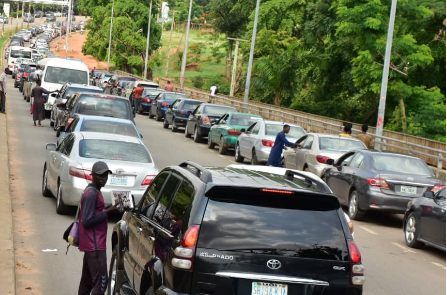The scarcity of premium motor spirit (PMS), commonly known as petrol, persists nationwide, prompting the emergence of black market vendors selling the product at exorbitant prices, reaching as high as N1,200 per litre in certain areas. Despite assurances from the Nigerian National Petroleum Company Limited (NNPCL) that the issues leading to the scarcity had been addressed, many filling stations remained closed, causing long queues at operational ones across the country.
Reporters from Daily Trust conducted investigations nationwide and found that numerous filling stations in the Federal Capital Territory (FCT) and several states had raised their prices, with petrol being sold between N750 and N800 per litre. However, NNPCL outlets dispensed petrol at N617 per litre, albeit with longer queues observed.
Motorists faced challenges as many stations in various parts of the country, including Dutse, the Jigawa State capital, were shut down. Meanwhile, black market vendors took advantage of the situation, selling petrol for as much as N1,100 per litre. Consequently, many residents resorted to walking long distances as they abandoned their vehicles due to the scarcity.
In the FCT, long queues formed at filling stations like NIPCO in Bwari, while stations like AA Rano, RainOil, and Shema in Jabi sold petrol at prices ranging from N680 to N690 per litre. In Lagos, similar scenes unfolded, with few stations dispensing fuel and reports of black market sales at inflated rates.
Chairman of the Independent Petroleum Marketers’ Association of Nigeria (IPMAN) in Ejigbo, Lagos, Akinrinade Akinade, revealed that most depots in Lagos were out of stock, exacerbating the shortage. However, the NNPCL spokesman, Femi Soneye, reassured that product availability remained intact despite distribution challenges.
In Kano, petrol stations sold the product for as much as N950 per litre, leading to lengthy queues at stations selling for N860 per litre. Some stations, such as Aliko Petrol Station and AA Rano, remained closed, contributing to the scarcity woes.
Related posts:
Enugu Constable Applicants' CBT Set for Tuesday, Wednesday3 months ago
Breaking News
Wanted Monarch Accused of Soldiers' Killing Turns Himself In to Police3 months ago
Breaking News
Rivers Women Rally in Support of Fubara Cause"3 months ago
Breaking News
PDP Ward in Rivers Suspends Representative Allied with Fubara3 months ago
Breaking News
IPOB Criticizes Ongoing Trial of Kanu3 months ago
Breaking News
